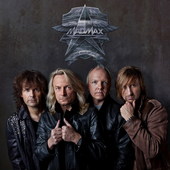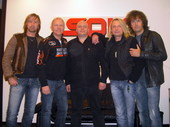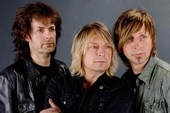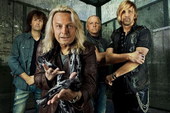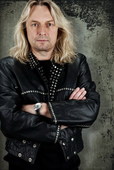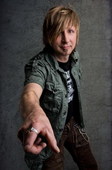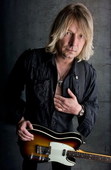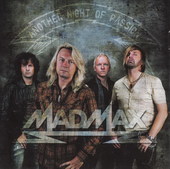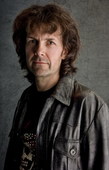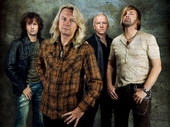Mad Max
To Hell And Back Again
15.05.2012
Архив интервью | Русская версияFinishing an unfinished business feels really good, and this is just the case with this interview. Originally my chat with Mad Max was supposed to take place in early 2007, when these cult 80’s German heavy metallers undertook one of their comebacks with the album “Night Of White Rock”. However, the interview never happened due to the turbulent events that ended up with me falling out with my previous webzine and establishing the webzine that you’re now reading. But there’s always room for a second try, and that’s what we do exactly five years later, when Mad Max are back yet again in their original line-up and a new album, aptly titled “Another Night Of Passion” to evoke their classic 1987 release “Night Of Passion”. However, when you speak to Michael Voss, the band’s singer, guitarist and main composer, it’s pointless to limit yourself to just Mad Max. After all, this is the person who also stood behind Casanova, Demon Drive and Silver, had a brief stint in Bonfire and even mixed the latest record of very big Russian heavy metal band Kipelov! So many things to discuss in such a short period of time, but we did our best…
First of all, how did the idea to reunite the “Night Of Passion” line-up and do a sequel of that album come about? Was it the band’s idea or did it come from labels or promoters?
That happened in France last year. At the MIDEM music fair in Cannes I had a meeting with Olly Hahn of SPV, and he said, “Michael, could you imagine doing another album in that direction?” I said, “OK, I am going to talk to the boys”. We had no contract then. The band sat down together, and we said, “Yes, we could do it”. Then we started to write the songs for the album.
What was your drummer Axel Kruse doing for the past few years while he was away from Mad Max?
We split about four years ago because he wanted to concentrate more on the band Jaded Heart. All the others – Jurgen (Breforth, guitars), Roland (Bergmann, bass) and me – stayed together and recorded two more albums. But it was really important for this album that Axel came back, because we needed the chemistry and the special type of drumming.
I remember how Wolf Hoffmann from Accept said that when they brought the band back together, they would sit down and listen to their old records to get back the right feeling for the songwriting process…
That’s what we did as well. We were listening to “Night Of Passion” and the earlier albums and analyzing them. You’ll find a copycat on the new album, which means that you’ve got two very fast songs, you’ve got one boogie shuffle, you will find an instrumental there, and you will find a cover version of The Sweet.
The album starts with the song “Rocklakhoma”, and obviously it’s about the U.S. festival of the same name. I know that your previous album “Welcome America” (2010) was also inspired by your trip to that festival. What was it that impressed you so much about America?
I’ll tell you what – when I come to your country for the first time – because I have already done two productions for Russian bands – I will write a song about your country as well! (laughs) It’s because going there is exciting, I’ve never been to Russia! For us America was exciting, too, because it was the first time that Mad Max was playing in America. Jurgen wrote the lyrics to “Rocklahoma”, he said, “Here are the lyrics”, and I really liked them. We were all so infected by the lyrics, and Roland came up with a riff that was like a Scorpions riff, something like “Dynamite”. That’s how it happened with “Rocklahoma”. It was the first time in 25 years that we played in America, and we wanted to capture the vibe and to express it in a song.
By the way, will the new album be released in America?
Yeah! I have done a couple of interviews with American journalists today. I think it’s coming out one month later, but it’s going to be released in America.
In general, what are your expectations from your new label SPV?
Well, I’m so happy that we are signed to SPV, because everything feels right now. We had a chance 30 years ago when we were once sitting at the SPV headquarters, but it didn’t happen. After all these years we are back again, and I think they are a great record company, a hard rock and metal label, and that takes us to another level. I think that’s very important, that feels good.
A few years ago when Mad Max decided to come back after a long period of silence you reinvented yourselves as a Christian metal band. How did it happen, why did you decide to change your lyrical direction so much?
What many people don’t know is that when I left school, I was studying theology. But instead of becoming a priest I decided to become a heavy metal singer. (laughs) In 1986 we supported Stryper on their European tour, and that left an impact as well. I was talking a lot to the Stryper guys, Oz Fox and Michael Sweet, they are friends of mine. What happened with “Night Of White Rock” (2006) is that my guitar player Jurgen came up with these lyrics, and we figured out that we love them. We decided, “Let’s give it a try, we will do two or three songs and see what happens”. They felt so good that we thought, “Maybe we can do a whole album”, and that worked.
As far as I understand, on “Another Night Of Passion” you don’t have Christian lyrics, you are coming back to the lyrics that are more familiar to fans of 80’s Mad Max…
Yeah, absolutely. We’ve got one song like that on the album, it’s called “Fallen From Grace”. I’m very proud of that song, because it’s such a Dokken-like riff. It was a collaboration, Don Dokken provided the vocal melody and lyrics, he wrote the song together with Mad Max.
More about collaborations – last year you released an album with Michael Schenker called “Temple Of Rock”. How did you become the singer in Michael’s band?
I’ve been working with Michael for a couple of years. We did an acoustic album, we did a live DVD, a lot of things really. Michael gave me a call last year, he was searching for a studio to record some demos, and when he came to my studio for recording them, he invited Herman Rarebell of Scorpions and Pete Way of UFO as well. The four of us sat here together, we jammed around, I was singing, and Michael said, “Well, it sounds great, let’s try and do some recording!” It ended up with me singing 10 songs on the album – that’s how it all happened. (laughs)
Michael has been working with a variety of singers lately – yourself, Robin McAuley, Doogie White – and other musicians in his band also change, or rather rotate, all the time. Why does he do so instead of having a permanent line-up?
I think the most important thing is that Michael is a brand of his own. You see, he’s not even performing as Michael Schenker Group when he’s playing now. It started last year when we played in England, the shows were billed simply as “Michael Schenker”. He’s got his own brand, like Slash does, for example, and he’s working with different singers. People should understand that the most important thing is Michael Schenker. At the moment Michael is touring America with Robin McAuley, and while I’m on tour with Mad Max supporting Axel Rudi Pell, he’ll be touring Europe with Doogie White. But I’m grateful that I will be playing with Michael in Japan. The fans get the best of three worlds! (laughs)
Apart from being a singer and a musician, you are also a very well-known producer. How did you get into producing? What was the first record you produced? Was it the first Demon Drive album (“Burn Rubber”, 1995)?
Hm, it’s a good question. I started with a four-track, then I moved to an eight-track and a sixteen-track. It all began – yes, you’re right – with the first Demon Drive album for Long Island Records in 1995, that was the first album that Angel Schleifer and me produced on our own.
Were you always interested in recording music, or did it all happen because there was no one else available?
Because I’m a songwriter, I always wanted to capture ideas. This is why I started in the 80s with a four-track analogue recording unit, then, as I said, I moved to an eight-track, a sixteen-track and an Atari computer, and in the end I switched to Logic in 1997 or 1998. It was so interesting to meet people, to work with various musicians, it was a true gift, yeah!
Among all your works as a producer, one is of special interest to the Russian audience. I am speaking about the band Kipelov and their latest album “Zhit Vopreki” (2011). How did they get in contact with you? Was it your first encounter with the Russian metal scene, or were you aware of any Russian bands before?
Back in the vinyl days I was listening to a record by Gorky Park, and I think they had a couple of great songs. What happened with Kipelov was that once I got a phone call from the middle of nowhere, and the manager of Kipelov, Zhenia is his name (Yevgeny Odintsov), told me, “Well, I’ve got this band fronted by the ex-singer of Aria, and it’s very interesting”. He sent me the material and it was such wonderful music and the playing was so good, it was incredible! That’s how it happened, and I’m really proud of our cooperation. Zhenia was a big fan of my work, first we had a try-out, and they liked what I did, so I got the chance to mix the whole album.
If Kipelov starts shopping around European labels for a record deal, how big are their chances of getting signed?
I think they tried it once, they changed their lyrics into English, I think it was a couple of years ago. But I’d like to have an album in the Russian language out in Europe, because they are a very good band. When it comes to playing their instruments, they are great, and the singer is incredible. I would love them to come here to play a couple of shows.
Speaking about labels – the four Mad Max albums of the 80s were recently re-released by Polish label Metal Mind. Did they cooperate with you on those re-releases, or did they just put them out themselves?
No no, we were cooperating. They got a sublicense for the first four albums from Roadrunner Records, and we gave them the pictures and so on. They are a very good company and very nice guys, so they did a great job on all of the albums. I’m really proud of that as well.
What can you say about the quality of their remastering? I’m asking this question because Metal Mind often gets criticized for “twisting” the original sound on their re-releases…
As far as I can remember, I did the remastering here in my studio, so I think it’s fine.
How do you now look on the band’s career in the 80s? What were the mistakes that you made? Was there a chance to keep the band alive after “Night Of Passion”?
Well, not really. We had a chance to go over to America, but Roadrunner wanted to sell their whole back catalogue to CBS, and CBS were only interested in Mad Max. So this didn’t happen, and I quit the band. But everybody was very young, we had the hell of a good time, and I won’t miss a single minute. In the end, the most important thing is that you Roman and me here are talking about the music, and that’s what keeps us alive. It’s a gift of God that we can talk about music and make music, and that’s the most important thing.
Looking back, don’t you think that you could have achieved a bigger success…
(cracks) Man, I’m totally happy! I’m totally happy with my life, really. I’m a really happy man, I can go to Japan, I can go to America… I have never been in Russia – please invite us to Russia because I’d love to play there. Maybe we should support Kipelov, that would be perfect! I will talk to their manager, because I’d love to share the stage there. I’ve traveled to a lot of countries, and my friend Joe Lynn Turner is always telling me, “You gotta go to Russia, it’s wonderful, it’s beautiful”, and the drummer of U.D.O., Stefan Kaufmann, who is a friend as well, also says, “Go to Russia!” Yeah, I’d love to!
Indeed, it would be great to have you here after all these years! But let me put a question a little bit differently – why wouldn’t you keep one band name, instead of changing from Mad Max to Casanova and to Demon Drive and then back and forth?
This is what they call “ammunition of an artist”. If you compare an artist to a painter, for example, Pablo Picasso, he’s got a period of red, a period of blue, and you never know what happens next. It’s all about being creative and following your chances and challenges in life. It was never planned that I would be working with Mad Max for so many years and that I would quit Casanova and make it history, even though it was a very important thing for me as well. The only thing that’s really keeping me rolling is being creative every single day. I’m going to my studio, creating songs, talking to people and recording music, this is what matters to me.
Shall there be any more records from Demon Drive?
Demon Drive does not exist anymore because my friend Angel, who did that band with me, is living far away in America now, and he’s doing different business, so there is no need for going back. I will concentrate 100% on the career of Mad Max now, this is very important for me.
Can you say a few words about Wolfpakk? Is it a one-off project, or do you intend to continue with it?
We are waiting for sales figures from AFM Records. Mark Sweeney, the Swiss guy, is a very nice guy and a great singer, and if there is a chance to do a follow-up album, that would be wonderful! I will love to do it.
Can you say a few words about your career in kids’ music?
Yeah, I’m starting the next production this Wednesday! It is world music for kids, and it’s part of the great project called Curry Boogie, I’ve been doing it for six or seven years now, it’s so wonderful to have kids here singing in my studio! Another production I’m doing is a kids’ musical that I’m doing with a friend of mine from Spain in my studio in May. We are passing the torch to the next generation! It’s the most exciting thing to work with kids who are 10-15 years, I tell them the tricks, and when they come to the studio and start to sing, that’s absolutely delightful!
With so many projects going on, do you have time to listen to other people’s music?
Sometimes yes, but most of the time I’m in the studio and concentrating on my own music. At the moment I love to listen to Celtic music, something from Scotland, and when I come back home very late in the evening, I’m just putting a CD of Loreena McKennitt on and relaxing.
Now I have a few assorted questions about various points of your past career, if you don’t mind. For instance, how did you end up playing live with Bonfire in the late 80s? And why did you stay for only a short time?
I remember I quit Mad Max and started to work with two ex-Warlock members on the Casanova project. At that time my friend Angel Schleifer from Bonfire gave me a phone call from Los Angeles and said, “Hey, listen, we are shooting a video, and Hans Ziller, the guitar player, has quit the band. We want you to join”. I said, “I cannot do it because I’m working on the Casanova thing. There are so many other guitar players around, try to find another one. If you don’t find another one, I will do an audition”. Two months later they shot a video, that was for the “Point Blank” album, and said, “Can you come to the rehearsals? We have tried a lot of guitar players, but they didn’t work”. I went there to Munich, I got the job and I spent the next two years on tour. That was a great time. I stopped Casanova, but after the tour I got a chance to sign a contract with Warner Brothers for the first Casanova album, so we started from there again.
The second Casanova album (“One Night Stand”, 1992) contains the song “One Of These Days”, which is credited to Deaffy. As far as I know, Deaffy is the name which Gabi Hoffmann, the manager of Accept, used back in the 80s and 90s. How did it happen that you recorded her song?
It was actually written by Gabi and Wolf. Gabi and Wolf are still my friends, they are living in Nashville, and we’re talking via Skype a lot of times. Record companies those days were searching for singles to put out. They had an idea to try this song, it’s a bit country and German and stuff like that, and Warner Brothers liked it.
In 1999 the other members of Casanova threatened to sue you if you released the album “Heroes” in Europe. What was the problem?
That’s why Casanova broke up – there were four people, and everybody in the band wanted to be a big boss. We kicked off in Japan, where we got a deal with Avex Tracks for the local market, and then Udo Dierkschneider offered us a deal with Breaker Records / Nuclear Blast for Germany, but they wanted to change the songs and do a new production. It was complicated, as it always was with Casanova, and I said, “Forget it, I’m not there anymore. It will never happen again”.
But it did happen again – five years later Casanova released the album “All Beauty Must Die”…
Right, but it was the same – too many chiefs in the band. We came up with a great record deal with Khalil (Turk) of Escape Music, we did a very nice record, but in the end there was no point to continue, because relations in the band are too complicated to work together.
How did you end up playing guitar on the cover version of “Legends Never Die” performed by Doro Pesch?
It was on the “Fight” album (2002), wasn’t it? Doro is a friend of mine, and we wrote together some music for the Silver album that Gary Barden was singing on. It was a returning favor – Doro sang some backing vocals on the first album and co-wrote a song, and I said, “I’m at your disposal”. So I went to the studio and played a couple of lead breaks for her. I really like her voice, I like the music that she’s playing, it’s great.
What is now happening with Silver?
We did five albums – three on Point Music, and two on MTM. At the moment Gary Barden is living in Thailand, he’s out of the United Kingdom. Today I received five demos from the songwriter, and maybe we’ll do another album, but I don’t know yet.
Many people complain about the state of the music industry today, with people downloading too much stuff and bands having to tour all year long to earn their living. How do you see your future as a producer and musician in such an environment?
I think you’ve got to promote your own stuff. 20 years ago record companies did the promotion, and SPV are still doing it now, they’ve done a perfect job, but it’s getting harder and harder to be an artist, I have to admit. On the other hand, everything is changing, it’s 2012, you have to go for it, and if there’s a challenge, then take this challenge.
Mad Max on MySpace: http://www.myspace.com/madmaxmusic
Special thanks to Maxim Bylkin (Soyus Music) for arranging this interview
Roman Patrashov
February 20, 2012
© HeadBanger.ru
